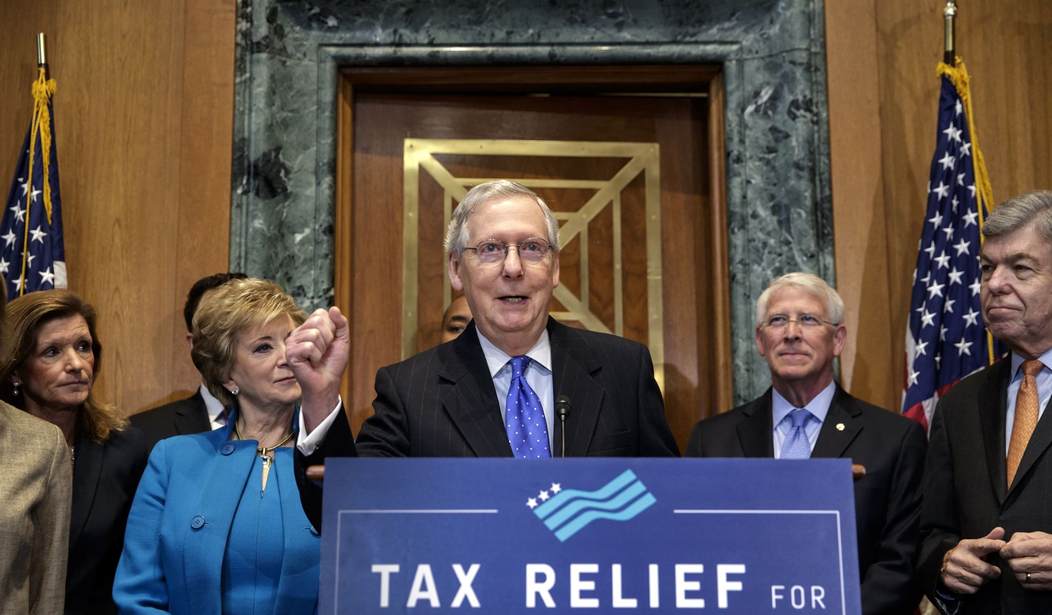Are the current Republican tax bills, passed by the House and Senate and being reconciled in conference committee, an attack on "feds, eds and meds"? That's a reference to the government, health care and education jobs that local Democrats in Dayton, Ohio, told Sen. Sherrod Brown have been fueling the area's comeback.
The Dayton area's reliance on government is in tension with its history as an incubator of private-sector inventiveness, which more than a century ago produced the first cash register, the first airplane and the first automotive electronic ignition.
That's a melancholy reflection. But the implied complaints about the tax bills have more basis than the apocalyptic rhetoric coming from journalists (Kurt Eichenwald: "America died tonight") and Democratic politicians (Nancy Pelosi: "the end of the world").
The Republican tax bills would indeed reduce revenues to the "feds," with surprisingly small rate cuts for high earners and by cutting the corporate rate from 35 to 20 percent. The current rate, the highest in the world, has to be lowered sooner or later, as most liberal economists (and Barack Obama) have long admitted.
And it is hard to take seriously those moaning about increased budget deficits from those unwilling to reform entitlements, which includes all Democrats and many Republicans, notably Donald Trump.
The critics have more of an argument when it comes to "eds" and "meds." But there's a counterargument there, as well -- that the tax bills push against the counterproductive government policies that have been pushing up education and health care costs, to the detriment of the consumers thereof.
Recommended
The tax bills would impose a new 1.4 percent tax on the investment income of endowments of very wealthy colleges and universities. They would eliminate deductions for student loans and tax tuition waivers for graduate students.
These institutions have been coasting on their reputation for excellence and as havens of free thought, even as they impose speech codes, conduct kangaroo courts on sexual assault charges and allow humanities and social science departments to be dominated by postmodern agitprop and gibberish.
Student loans impoverish many students, especially dropouts, while the money they pump into universities produces administrative bloat, to the point that there are more administrators than teachers in higher education today. Government subsidies produce an oversupply of people with doctorates, causing their theses to go unread and their job prospects to be dismal.
Polls show that many voters have become aware of the intolerance and unaccountability of these institutions and that the economic rewards of a degree are diminishing. The tax bills send a signal to the people running higher education that they'd better change their ways.
On health care, the Republicans have sent a similar signal by repealing the Obamacare mandate to buy insurance. It turns out that this "tax" -- as Chief Justice John Roberts insisted it is -- falls most heavily on those with modest incomes, leading many of them to conclude that Obamacare policies are a bad deal.
Or consider the yelps about the Republicans' planned repeal of the deductibility of state and local taxes (except for some property taxes). This would be progressive in its incidence because most of the increased federal revenue would come from high earners in high-tax states, especially New York, New Jersey, Connecticut and California, whose residents tend to vote Democratic.
Americans in lower-tax states have been effectively subsidizing bloated public payrolls and astonishingly generous pension plans. Removing the deduction would put pressure on politicians in high-tax states and on the public employee unions to hold taxes and spending down.
This change, plus a possible Supreme Court ruling that public employees cannot be forced to pay union dues, should reduce the largesse that public employee unions have been contributing to Democratic candidates in these states and nationally. Seeing as public employee union dues come from taxpayers, this amounts to public financing of the campaigns of one political party. It shouldn't be surprising that the other party wants to stop it.
An Agriculture Department report on the expenses of raising a child showed that over the past several decades, the costs of health care and education -- despite or because of government subsidies and regulation -- had increased much faster than inflation. The costs of food and clothing, mostly provided by the private sector, have actually decreased in real dollars.
The Republican tax plans can be seen as a pushback against "feds, eds and meds" inflation and a push toward something more like what private-sector innovators (like those in long-ago Dayton) have been able to deliver.
























Join the conversation as a VIP Member